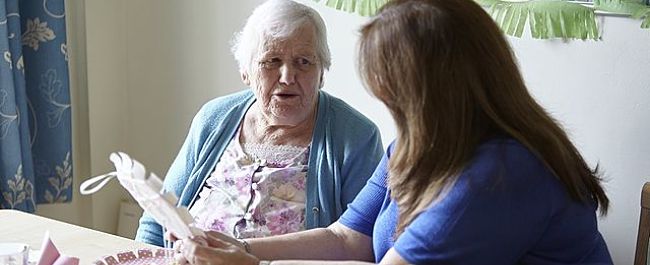Care homes need urgent review

This research examines how we can improve the quality of life of older people in care homes.
About the research
There is growing concern about our ability as a society to cope with the care demands of increasingly ageing populations. Recent media coverage has drawn attention to the poor standard of care available in many care home settings and the increasing pressure on these services. There are currently over 20,000 care homes in the UK, supporting 400,000 older people. It is well documented that social isolation and depression are huge and growing problems in care homes, impacting on residents’ quality of life, physical health, and even mortality. Through two research projects academics and practitioners are exploring how care homes might be re-imagined. The Tangible Memories project aims to improve the quality of life for care home residents by building a sense of community and shared experience through exploration of residents’ life history stories. The Healthy Ageing in Residential Places (HARP) project focuses on identifying what makes a care home a good place to live and work, through drawing comparisons between care homes in Britain, Canada, Norway and Sweden.
Image: wikimedia.org/wikipedia/commons/
Policy implications
- Care workers need to be appropriately trained and duly respected. There is a need for more respect for care workers and increased recognition of the skills and expertise required to do their job well. A commitment to staff development and training is vital to ensure that older people can continue to live rich, creative, cultural and learning lives.
- Community should be emphasised in residents’ experience. Personalisation of care is important but many residents also value opportunities to live and be together as a community.
- Care homes should be well integrated into wider society . There is a need to recognise the contribution that older people living in care homes can continue to make to society and as such care homes should not be ‘fenced off ’, literally or metaphorically.
- Digital tools can provide an effective means of improving the quality of life of older people and should be used more readily. It is possible to co-design digital tools in collaboration with older people. These can empower staff to build an understanding and to take better account of the personal needs, interests and histories of older people.
Key findings
- Concepts such as dignity, respect and equality are an important part of feeling ‘at home’ in care settings.
- Older people are interested in talking about the present and the future, not only the past. They enjoy being asked to learn and take on new challenges. On the Tangible Memories project residents have told us about important events happening in their lives now as well as those in the past.
- Life in the present for older people should be pleasurable, with emotional warmth and sensory enjoyment. Both the Tangible Memories and the Healthy Ageing in Residential Places projects have established the importance of care homes providing plenty of opportunities for people to enjoy music, theatre and other creative pursuits.
- The health and wellbeing of residents cannot be separated from the health and wellbeing of staff. Each contributes to the other. Staff must be paid a living wage and experience decent living conditions.
- Co-design of technologies with older people can generate technologies that improve the emotional well-being of residents and enable care staff to know residents better. On the Tangible Memories project we have worked with residents to co-design a story-telling swing and a personalised musical cushion.
Further information
You can read further information about the Tangible Memories project. www.tangible-memories.com
The Healthy Ageing in Residential Places (HARP) project takes a broad view of health that includes mental, physical, emotional, social and spiritual aspects. It is part of the international Reimagining Long Term Residential Care project.
Towards the All Age Friendly City: The All-Age-Friendly City project, carried out in Spring-Summer 2014, emerged from a desire to imagine the future city from the perspectives of those people – children and older adults – who are too often overlooked in the design and planning of cities today.
Bristol Ageing Better is a partnership of individuals and organisations working together to reduce isolation and loneliness amongst older people in Bristol. They have recently secured Big Lottery funding to improve the lives of older people in the city.
As part of the University of Bristol Productive Margins project a new piece of research exploring co-producing services with older people to combat social isolation and loneliness is about to begin in the Greater Bedminster area of the city.
Alive! Activities is a charity dedicated to improving the quality of life of older people in care who have worked with us on the Tangible Memories project
Policy Briefing 8: 2014
Contact the researchers
Dr Helen Manchester, Graduate School of Education, University of Bristol:
helen.manchester@bristol.ac.uk
Dr Liz Lloyd, School for Policy Studies, University of Bristol:
Liz.lloyd@bristol.ac.uk
Authors
Dr Helen Manchester, University of Bristol
Dr Liz Loyd, University of Bristol